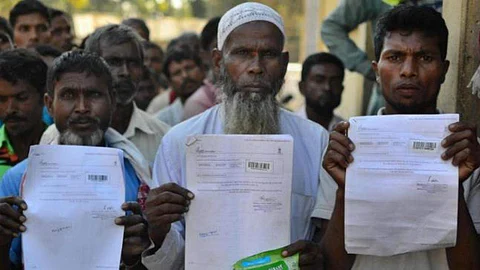Law schools in India come together, to extend legal aid to 19 lakh citizens excluded from NRC in Assam
Parichay, a collaborative legal aid clinic launched on Tuesday, will assist people excluded from the National Register of Citizens (NRC) in Assam. Parichay, which is a conglomerate of law schools in India, said that the clinic would function as a clearinghouse of litigation and research assistance for lawyers filing appeals against exclusion from the NRC. The collaborating institutions include National Law University and Judicial Academy, Assam; West Bengal National University of Juridical Science Kolkata; NALSAR Hyderabad, National Law University Delhi, and National Law University Odisha.
Sources said that some other law schools are also in the process of formalising their collaboration with Parichay. The clinic will assist lawyers in drafting appeals, conduct research on pertinent questions of the law, assist in training lawyers and paralegals, and generate documentation on the functioning of Foreigners' Tribunals (FTs). The law students will work with lawyers to ensure that they are able to file effective appeals before the FTs.
The founding team of the clinic includes Anup Surendranath, M Mohsin Alam Bhat and Darshana Mitra. Surendranath is an assistant professor of law at National Law University, Delhi — Bhat is an assistant professor of law at Jindal Global Law School, and Mitra is a lawyer and researcher based in Kolkata. Parichay will be headquartered in Guwahati and will work with teams of student volunteers across the country. Students will be selected through a selection process to constitute a core team and a pool of volunteers for research and drafting. The core team will work with the programme director to coordinate Parichay's activities between lawyers and student volunteers. Each collaborating university has appointed a faculty advisor who will coordinate on behalf of the university with Parichay. "Parichay is an extension of NUJS's commitment to the provision of legal aid, to fulfil the constitutional mandate under Article 39A of the Constitution of India," said Dr NK Chakrabarti, Vice-Chancellor of West Bengal National University of Juridical Sciences.
Parichay will also collaborate with civil society to provide legal aid to communities."This is a historically-unprecedented collaboration among law schools in India, and we believe that this is necessary to ensure that no one is deprived of his or her right to legal representation," said Professor JS Patil, Vice-Chancellor of National Law University and Judicial Academy, Assam. Over 19 lakh people were excluded from the final list of the NRC published on August 31. Those excluded can challenge exclusion by filing appeals in the FTs. There is a 120-day window for the same and the process will begin following the issuance of speaking orders citing the reasons behind exclusion by NRC authority.
According to Professor Srikrishna Deva Rao, Vice-Chancellor of National Law University Odisha, "Citizenship grants an individual identity in the eyes of the state and allows them to enjoy other human rights. Deprivation of citizenship, therefore, can result in further deprivation of an individual's basic human rights."
"After the NRC absence of effective legal aid would mean that many persons would be rendered stateless without due process. An innovative collaboration like Parichay is essential to prevent such a humanitarian crisis," said Professor Faizan Mustafa, Vice-Chancellor of NALSAR University of Law, Hyderabad. Parichay will also conduct documentation of the NRC exercise. Based on this, it will generate policy recommendations that can inform legal and policy discourse on citizenship laws in India. "As universities, we have access to resources and networks that can and should be mobilized towards building jurisprudence on one of the most important questions of constitutional and public law faced by the country today, i.e., who is an Indian citizen", said Professor Ranbir Singh, Vice-Chancellor of National Law University, Delhi. Parichay is being supported by the collaborating law schools from within their legal aid budgets.


